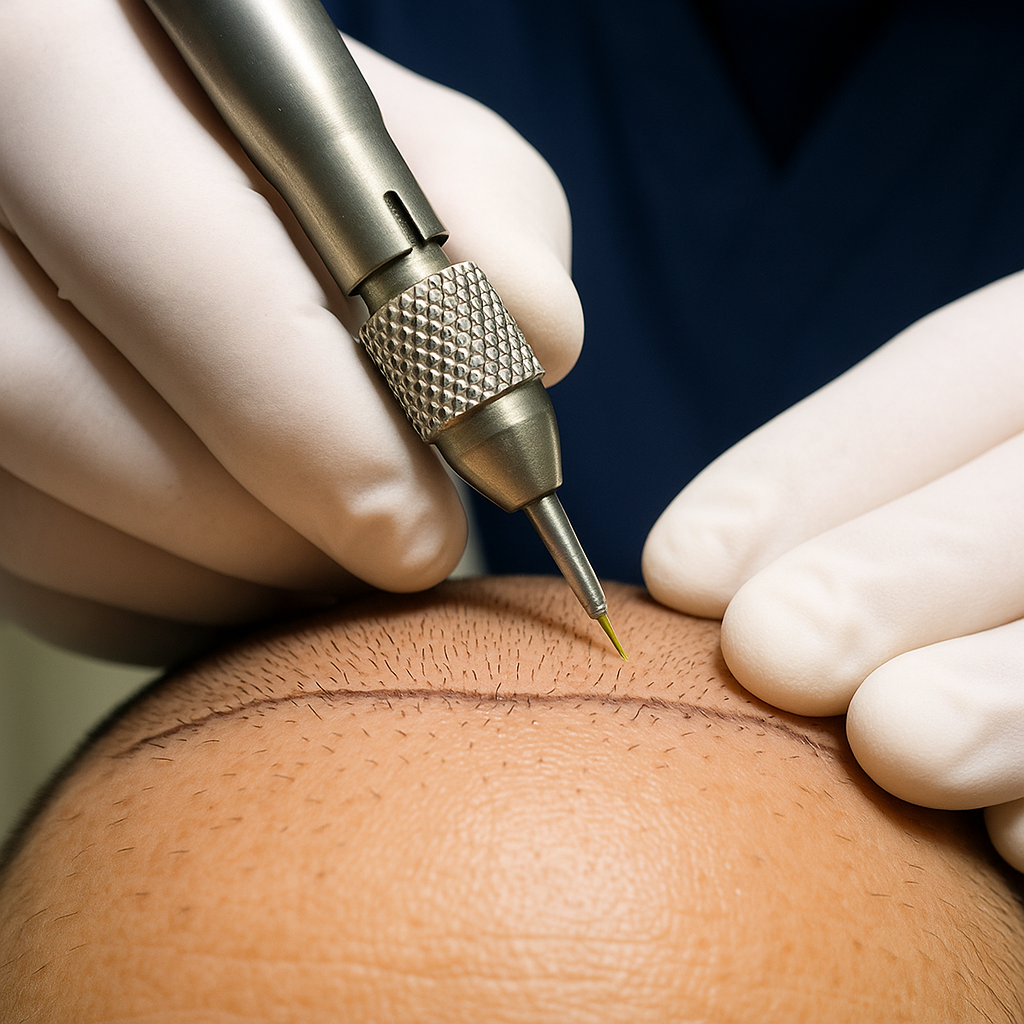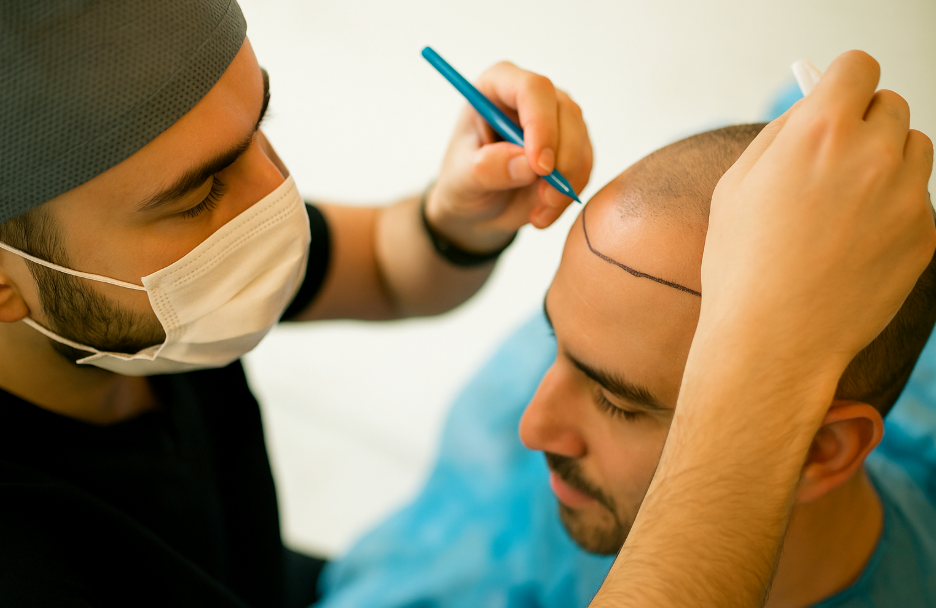Is a hair transplant in Turkey safe? This is one of the most common questions patients ask when considering treatment abroad. In 2025, Turkey remains the leading destination for hair restoration, offering affordable but safe options backed by skilled surgeons and internationally accredited clinics. Every year, tens of thousands of patients from Europe, the Middle East, and the United States travel to Istanbul, Ankara, and Antalya for procedures that combine modern techniques with strict safety standards.
The short answer is yes. A hair transplant in Turkey is safe when performed at a licensed clinic by an experienced surgeon using advanced methods such as FUE, DHI, or Sapphire FUE. Patients who choose reputable providers not only save up to 70 percent compared to the United States or the United Kingdom but also benefit from international medical oversight and comprehensive aftercare.
Book a Free Consultation
Why Turkey Has Become the Leading Destination for Safe Hair Transplants
Patients researching hair transplant safety often compare Turkey with the US, UK, and Germany. Turkey consistently ranks at the top due to its combination of high medical standards, surgeon expertise, and affordability.
Experienced Hair Transplant Surgeons in Turkey
Turkish doctors are internationally recognized for their expertise. Many perform thousands of successful transplants each year, focusing exclusively on hair restoration. This high case volume allows surgeons to perfect techniques like FUE (Follicular Unit Extraction) and DHI (Direct Hair Implantation). Both methods are considered safe, though when comparing FUE vs DHI safety in Turkey, patients often find that DHI provides quicker healing, while FUE offers flexibility for different levels of hair loss.
Safe and Modern Techniques
Turkey has become known for adopting the most advanced technologies in hair transplantation. Outdated FUT strip methods are rare, while minimally invasive procedures dominate. Techniques such as Sapphire FUE improve graft survival rates and reduce scarring. For international patients asking “Is Turkey safe for medical travel?”, these modern methods are a key reassurance.
Accreditation and Government Oversight
The Turkish Ministry of Health regulates medical tourism and requires clinics to be licensed. Many leading providers also hold Joint Commission International (JCI) accreditation, demonstrating compliance with global standards. Patients who select accredited hair transplant clinics in Turkey benefit from strict hygiene protocols, qualified medical teams, and consistent post-operative care.
Cost Efficiency and Safety Combined
Affordability is one of Turkey’s biggest advantages. A high-quality hair transplant typically costs between $2,500 and $4,500 in Turkey compared to $12,000 to $20,000 in the US. Importantly, this lower cost does not mean reduced safety. Clinics maintain international standards while offering all-inclusive packages that cover accommodation, transfers, and recovery support. For more details, see our cost breakdown or secure your spot by booking a consultation.
Risks and How to Minimize Them
Like any surgical procedure, a hair transplant carries some risks. In Turkey, these risks are greatly reduced in accredited clinics.
Possible Risks
Minor swelling or redness, temporary scabbing and itching, infection if aftercare instructions are not followed, uneven growth if performed by inexperienced staff.
How to Minimize Risks
Verify that your surgeon is a member of the International Society of Hair Restoration Surgery (ISHRS). Read independent patient reviews and examine before-and-after photos. Avoid clinics advertising unlimited grafts at extremely low costs. Ensure the clinic offers thorough post-operative care and follow-up.
For a full cost breakdown, visit our hair transplant cost page. If you’re ready to start your journey, you can also book a free consultation with one of our experts today.
Turkey Compared to Other Countries
| Country | Safety Standards | Average Cost (3,000 grafts) |
| Turkey | High in accredited clinics | $2,500 – $4,500 |
| United States | Strict regulations | $12,000 – $20,000 |
| United Kingdom | Strong oversight | $8,000 – $15,000 |
| Germany | Regulated system | $10,000 – $16,000 |
Key Insight: Patients who choose accredited clinics in Turkey receive world-class safety standards and natural results at far lower costs than in Western countries.
Related Reading: See Our Full Cost Breakdown of Hair Transplants in Turkey
What to Expect During the Process in Turkey
The process of undergoing a hair transplant in Turkey is streamlined for international patients.
Step 1: Initial Consultation
Patients begin with an online consultation where they send photos for assessment and receive a treatment plan.
Step 2: Travel and Transfers
Most packages include airport pick-up, hotel accommodation, and VIP transport to the clinic.
Step 3: Pre-Surgery Review
On arrival, patients meet their surgeon for a final medical check and hairline design.
Step 4: The Procedure
The transplant is performed under local anesthesia and lasts between 4 and 8 hours depending on the number of grafts.
Step 5: Post-Operative Care
Patients receive recovery kits, medications, and instructions to support proper healing.
Step 6: Follow-Up Support
Accredited clinics provide ongoing monitoring, either in person or remotely, to ensure optimal results.
Is a Hair Transplant in Turkey Safe for You?
If you are healthy and choose a reputable clinic, a hair transplant in Turkey is both safe and effective. With skilled surgeons, advanced technology, and international safety standards, Turkey continues to be the leading choice for affordable and permanent hair restoration.
Your Questions
Answered
Yes. Istanbul and other major cities have advanced medical tourism infrastructure and internationally accredited clinics.
Check for accreditation, verify surgeon memberships in ISHRS, and read verified reviews.
Unlicensed centers may lack sterile conditions, increasing the risk of infection, failed grafts, or poor results.
Most patients resume normal activities within three to five days, though healing continues over several weeks.
Yes. Transplanted follicles are resistant to balding and will continue to grow naturally.
No. Hair transplants in Turkey are performed under local anesthesia. Patients typically experience only mild discomfort afterward, which is manageable with medication.
New growth usually begins after three to four months, with full results visible after 12 to 18 months.
·
Final Thoughts
So, is a hair transplant in Turkey safe? The answer is yes, when you choose an accredited clinic with experienced surgeons. By researching carefully, verifying certifications, and avoiding unsafe providers, you can achieve permanent, natural results while saving significantly on costs.
Ready to take the next step? Book your free consultation today and start your journey toward hair restoration with confidence.

